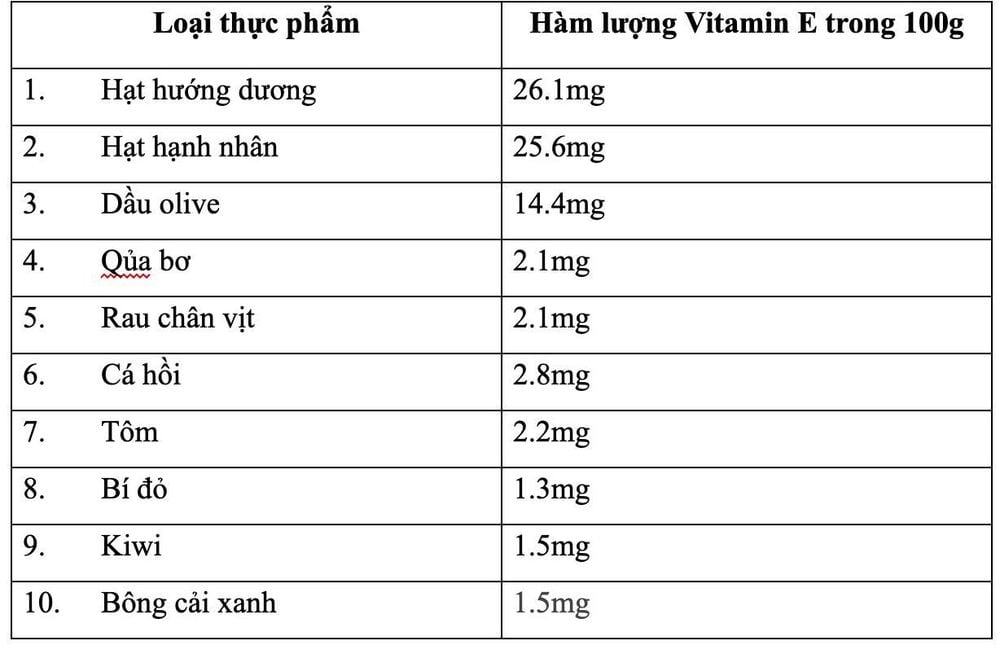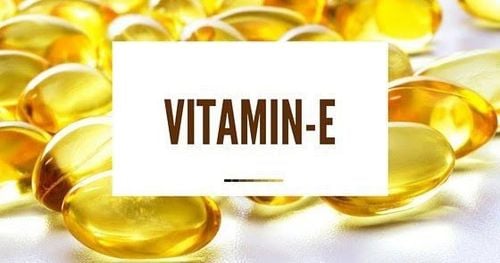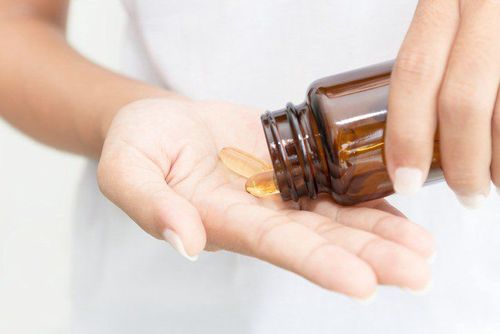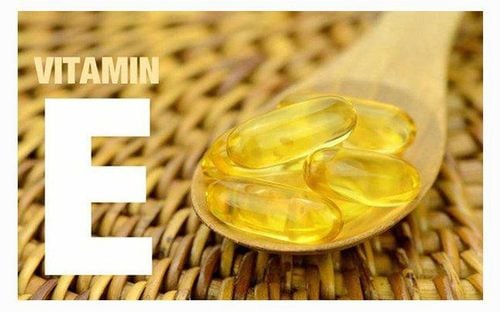This is an automatically translated article.
The article was professionally consulted with Doctor Vo Ha Bang Suong - General Internal Medicine - Department of Examination & Internal Medicine - Vinmec Phu Quoc International General Hospital.Vitamin E is a fat-soluble vitamin that protects cell membranes and other fat-soluble tissues in the body against oxidative stress damage.
When the body gets enough vitamin E can help protect against heart disease, cancer and age-related eye damage (macular degeneration).
Conversely, too much vitamin E from supplements can lead to excessive bleeding. Foods containing vitamin E, such as those listed below, are considered safe and healthy.
1. Foods that contain high amounts of vitamin E
Vitamin E is found in many foods, in nuts, vegetables, and fish. High concentrations are known in several varieties such as sunflower seeds, almonds, spinach, avocados, squash, kiwi fruit, salmon, shrimp, olive oil, wheat germ oil and broccoli. The need for vitamin E to stay active is at least 22 IU (15.4 mg). But to prevent skin aging and diseases, a dose of 100-400 IU/day can promote a positive antioxidant effect.Thus we see vitamin E in most foods to some extent. Therefore, most people are not at risk for this vitamin deficiency. Increasing the amount of vitamin E for your body is easy, you don't even need to supplement from oral tablets. You just need to have a reasonable diet such as adding some sunflower seeds, almonds to the diet.
You can also increase absorption of vitamin E from low-fat foods by eating them with fat. For example, if you like a salad with vegetables, just adding a tablespoon of oil to it can make a significant difference.

Danh sách các loại thực phẩm tiêu biểu giàu vitamin E
2. Health Benefits of Vitamin E
So far, the benefits of Vitamin E are undeniable. However, vitamin E deficiency is rare. Vitamin E deficiency only occurs in people with digestive problems or cystic fibrosis. For people with low-fat diets also make Vitamin E low. Nowadays, more and more people are taking vitamin E supplements in the hope that its antioxidant properties will help prevent or treat disease.Studies report mixed results on the effectiveness and benefits of Vitamin E in the prevention of cardiovascular diseases. The most common still shows the protective effect of vitamin E on the body in this group of diseases. Getting enough vitamin E reduces the risk of heart disease - Vitamin E is thought to help prevent heart disease by inhibiting the oxidation of low-density lipoprotein (LDL) cholesterol and helping to prevent possible blood clots lead to a heart attack.
Reduce cancer risk. With mixed and controversial evidence - Vitamin E may help reduce cancer risk by acting as an antioxidant and by preventing the formation of carcinogenic nitrosamines that form in the stomach from nitrite in food.
Enhance eye health (Prevention of macular degeneration). At least one study has shown that adding vitamin E to DV intake reduces the risk of age-related eye damage (macular degeneration) by 20%. Other studies on this effect of vitamin E are not many and the evidence is not convincing enough to confirm this role of vitamin E in the body. More research is needed in the future.
Reduces Chronic Inflammation - Preliminary studies suggest that vitamin E may help regulate the inflammatory response and may help people with type 2 diabetes or chronic heart failure who have chronic inflammation .
Reduces Risk of Dementia (Cognitive Impairment) (Controversial) - Preliminary findings suggest that increased levels of vitamin E have a protective effect on mental performance as people age. Further studies are needed to confirm this finding.
Reduced risk of ALS (Amyotrophic lateral sclerosis, Lou Gehrig's disease) (Controversial) - A long-term study found that increasing Vitamin E supplementation for 5 years may reduce the risk of ALS disease. Further studies are needed because of the small sample size.
3. Some warnings about vitamin E
With a normal diet, it is difficult to cause an excess of vitamin E in the body. In some cases, especially the group that often takes vitamin E supplements for purposes such as skin rejuvenation...High doses of vitamin E supplements can significantly prevent blood clotting and clotting, thereby increasing the risk of excessive bleeding or bleeding.
Nuts, seeds and oils are high-calorie foods and people with a high body mass index, who are trying to lose weight, should eat them in moderation.
Vinmec International General Hospital is one of the hospitals that not only ensures professional quality with a team of leading medical doctors, modern equipment and technology, but also stands out for its examination and consultation services. comprehensive and professional medical consultation and treatment; civilized, polite, safe and sterile medical examination and treatment space. Customers when choosing to perform tests here can be completely assured of the accuracy of test results.
Please dial HOTLINE for more information or register for an appointment HERE. Download MyVinmec app to make appointments faster and to manage your bookings easily.













